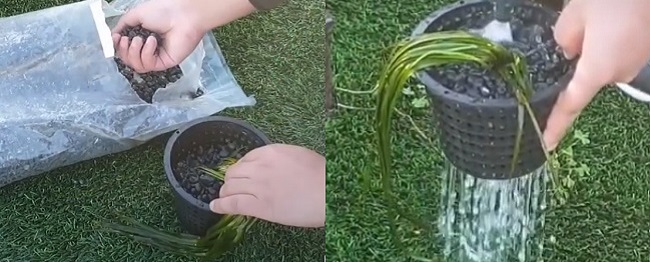Vallisneria Overview:
Vallisneria is also commonly
known as eelgrass, tape grass or vallis. It is a fresh water plant that can be
kept in aquarium or pond. Vallisneria is found in abundance in Asia, Africa,
Europe & North America.
Vallisneria is a tough plant
recommended for beginners. People in earliest days used to keep eelgrass in
aquarium & still this plant is famous & a lot of hobbyists keep them in
aquarium or pond.
Vallisneria is confused sometimes
with the superficially similar Sagittaria when this plant is cultivated
submerged.
Vallisneria should never be
confused with Zostera species, marine seagrasses that are commonly known as eelgrass.
Vallisneria likes to grow in slow
moving water, & it is usually found in ponds & streams. It prefers to
cultivate in shallow water, & are rarely discovered in deep waters that are
more than 10 feet deep.
Scientific Names of Vallisneria:
Vallisneria jacquiniana Sprengel
Vallisneria jacquini Savi
Vallisneria michelii Savi
Vallisneria micheliana Sprengel
Vallisneria pusilla Barbieri ex
Bertoloni
International Common Names of Vallisneria:
English names of Vallisneria are:
channel grass; eel grass; eelgrass; coiled vallisneria; eelweed; tapegrass; tape
grass; tapeweed; Jungles vals.
French names of Vallisneria are:
vallisnerie en spirale
Portuguese names of Vallisneria
are: saca-rolhas
Local Common Names of Vallisneria:
German names of Vallisneria are:
Gemeine Wasserschraube
Italian names of Vallisneria are:
alga di chiana
Dutch names of Vallisneria are:
wierblad
American names of Vallisneria are:
Vallisneria Americana
Watch how to grow Vallisneria in a pond in a video below:
Origin of Vallisneria:
Eelgrass is native to Asia,
Australia, North America, Central America & South America. It is usually
discovered in the East of North America, but according to recent reports this
plant is spreading to the west too.
Vallisneria Care & Maintenance:
Vallisneria Americana are very
tough, & can live in harsh conditions. They love to grow in hard, alkaline
water & may grow slowly in soft, acidic water. It can even grow in brackish
water & grow in rivers & bays with different levels of salinity.
When you are deciding substrate
for pond or aquarium, then my recommendation is to use CaribSea Eco-Complete.
This substrate can help the growth of plants & they cultivate lush &
thick.
Vallisneria Americana does not
need you to add carbon dioxide to pond, as they grow in shallow water which
does not have enough carbon dioxide. This plant however needs addition of iron
rich fertilizer for better growth. Make sure you add fertilizer to pond on a
weekly basis if you want optimum growth.
Tape grass needs high lighting
but they can even do well in modern lighting. However, under moderate lighting
the growth rates of this plant is slower. If you want to select a lighting for Tape
grass, make sure you select a high quality LED or a plant bulb.
Do not trim leaves of the plant;
& if you hurt the leaves then they will rot away & will pollute pond
water. If you want to trim leaves then use sharp scissors for this job.
Propagate Vallisneria:
Eelweed regrows through runners
in your home tank, which will root, & then grow into a fresh plant. Make
sure you do not separate runners from the plant until the complete growth of
the leaves. Then you can move it & replant elsewhere in the tank. If often
takes up to 4 weeks for the fresh plant to adjust to being relocated &
start growing again.
Eelweed rarely grows through
seeds indoor, & it usually just grows in ponds. If you are hobbyist make
sure you grow this plant through seeds in ponds. During growth, white female
flowers grow to the water surface while little male flowers escape & float to
the water surface. Then they are caught by female flowers & it helps in
pollination of the plant. Fertilization makes a long cylindrical pod, which
contains little seeds.
Tape grass is the best plant
against fish that hurt or uproot them. They can make the best choice for hobbyists
who want to keep cichlid but some of the species can still hurt them over time,
but their endurance rate is much better than other types of pond plants.
Vallisneria Tank Condition:
Minimum Aquarium Size for Jungles
vals: 29 Gallons (110 Litres)
Level of Care for Jungles vals: Beginner
Water Conditions for Jungles vals:
pH of 6 to 9, & Moderately Hard to Very Hard Water
Ideal Water Temperature for Jungles
vals: 18 to 28 Degree Celsius
Maximum Size of Jungles vals: 6
feet
Grow Vallisneria in Pond:
It is very easy to grow Vallisneria
in pond or aquarium. They prefer high lighting & but can grow in moderate
lighting too.
This plant does not need more
carbon dioxide because it grows in shallow water with low CO2. But you can add
fertilizers to grow them well.
I took Vallisneria & put it
in a netted pot. Then I filled the pot with substrate to protect Vallisneria
from getting damage. Do not damage the Vallisneria & ensure it is in the
center of the pot before filling it up with substrate. Also choose a large netted
pot because Vallisneria cultivates fast so make sure you are pre-prepared for upcoming
challenges.
Give a good rinse to the pot so
that impurities on the substrate are washed out. Quickly place the pot at the
bottom of the pond & ensure it is completely submerged in water. Fill the
pond with de-chlorinated water. Start the pond filter & you are good to go.
Pros & Cons of Vallisneria in pond:
Eelgrass makes vast forests using
its long ribbon leaves, which can as a shelter for a lot of fish &
invertebrates.
Channel grass can tolerate harsh
conditions & it is a beginner’s plant.
Many hobbyists love to keep
channel grass in aquarium. It grows fully submerged & it needs substrate to
dip its root in it. You can keep this plant in tanks or ponds with fish that
love to dig substrate but due to deep roots it makes it difficult for fish to displace
its roots. Due to its size, hobbyists use it as aquarium background, & the
plant speedily reach the top of small aquarium & it is better recommended
for tall aquariums or ponds.
Vallisneria Americana are among
the few species of plants that can grow in brackish water, though it will
affect their cultivation rate & propagation.
Do not trim leaves of coiled vallisneria because if you injure the leaves then they will rot away & will toxic pond water. If you wish to trim leaves of coiled vallisneria then use sharp scissors. Trimming of Vallisneria Americana is a problematic task because you can pollute pond water if you do it in wrong way.




Post a Comment